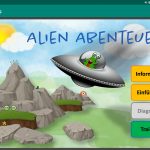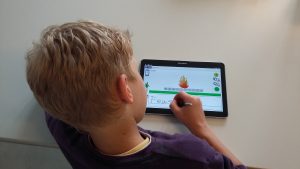In the 2019/2020 school year, a training program based on the Booost app was successfully implemented at two elementary schools in Lower Saxony, Germany. After a dynamic start at the schools, the flexibility of the method allowed for a switch to home training during the Corona-related partial school closures. Children with very severe spelling problems benefited particularly from the training with the spelling app; they rated the manageability of the program and their motivation as very good.




click on image for larger view
In the context of the study, we distinguish between children who worked consistently with our program (training group) and those who had little exposure to our tablet training due to the Corona-related change (control group).Trainingsgruppe gesamt:
- n = 23
- 16x 20 minutes training units on individual focal poonts of error
Control group:
- n = 36
- less than one training unit (average)
In spelling development, there is a significant increase across all participating children. However, the children in the training group with very severe spelling difficulties (n = 14, baseline score at the beginning of the Study of percentile rank ≤16 in the German spelling test Deret 2+ or 3+, Stock / Schneider, 2008) improved significantly more in their spelling performance than those in the control group (n = 27).
In the final questionnaire, the children, parents and teachers gave very positive ratings to the ability to integrate the exercise method into everyday life, its comprehensibility and the possibility of working independently with the tablet.
Integratability:
– In each case ≥ 80% of the evaluations with “good” or “very good”.
Comprehensibility / independent work:
– In each case ≥ 90% of the evaluations with “good” or “very good”.
The study results can be read in detail in the following article:
Mühlpforte, N., Hwang, T. H., Heldmann, M., Münte, T. F., Schmitz, G., & Effenberg, A. O. (2023). Acceptability and effectiveness of tablet-based orthography training with elementary school children. Learning and learning disorders.
The Booost app is a digital handwriting training method for promoting spelling in different learning contexts. It supports motivating, self-directed learning.
Handwritten spelling training on the tablet enables direct feedback on the correctness of the written words. This method (“errorless learning”) is intended to consistently counteract a consolidation of error-causing memory representations and to achieve an increase in error sensitivity.
On the progress of the overall project to date
In the first two phases of the project until the end of 2016, the influence of reduced word misspellings on the spelling and reading performance of words in elementary school-aged children with dyslexia as well as the increase of their error sensitivity was investigated. An initial program expansion was implemented by mid-2018. The overall project consisted of two subprojects (A & B).
Subproject A focused on investigating the training-dependent development of neural bases of error sensitivity in spelling error processing using event-related brain potentials. This project was conducted under the direction of Prof. Dr. Thomas F. Münte at the University Hospital Schleswig-Holstein, Clinic for Neurology in Lübeck.
The goal of subproject B was to develop a tablet-based spelling program with handwritten input capability. This project was conducted under the direction of Prof. Dr. Alfred O. Effenberg at the Leibniz University of Hannover, Institute for Sports Science. The tablet-based exercise method was tested for applicability and effectiveness. For this purpose, 21 children from the second to the beginning of the fifth grade with reading and spelling disorders practiced independently at home with the tablet four times a week for 20 minutes each over a period of four weeks.
A comprehensive program expansion served to prepare the use of our tablet-based learning method at the first elementary schools in Lower Saxony and Schleswig-Holstein in the 2019/2020 school year in order to test the application of the method in school practice in more detail.
The overall project was funded by the German Federal Ministry of Education and Research (BMBF) and was assigned to the research initiative “Developmental Disorders of School Skills” in the context of the BMBF Framework Program for the Promotion of Empirical Educational Research. For further information please contact the project management.
Contact
Project Management:
Leibniz University of Hannover
Institute for Sports Science
Prof. Dr. Alfred O. Effenberg: effenberg@sportwiss.uni-hannover.de
Dr.-Ing. Tong-Hun Hwang: tonghun.hwang@sportwiss.uni-hannover.de
Project support
Federal Ministry of Education and Research
Research Area
Dyslexia, Multi-Sensory Integration, Embodied Education



